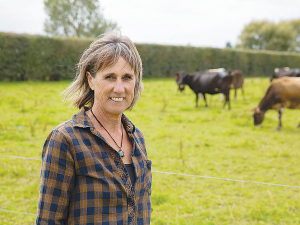Data empowers decision-making
Over the past two years, Fernside farmer Julie Bradshaw has refined her dairy herd size using genomics while maintaining the same level of milk production.
 Fernside dairy farmer Julie Bradshaw is passionate about the ability of genetics to create the most efficient herd of cows.
Fernside dairy farmer Julie Bradshaw is passionate about the ability of genetics to create the most efficient herd of cows.
Canterbury dairy farmer Julie Bradshaw has applied lessons from a five-year National Institute of Water and Atmospheric Research (NIWA) irrigation study to make science-based decisions while also using genetics to improve her herd – with the overall goal of reducing the farm’s environmental footprint.
Julie is participating in a six-month farming innovation project, which examines how the next generation of farmers are using innovative approaches to improve their farming practices. Waimakariri Landcare Trust (WLT) and Waimakariri Irrigation Limited (WIL) have partnered with the Ministry for Primary Industries (MPI) for the project, with support from MPI’s Sustainable Food and Fibre Futures fund along with Environment Canterbury, Ballance, and DairyNZ.
From 2016 to 2021, Julie and a group of five neighbouring farmers at Fernside participated in a co-innovation study which provided landowners with real-time data and forecasts to make science-based irrigation decisions.
The data included measured rainfall, soil moisture, soil temperature, drainage, and estimated evaporation as well as two, six and 15-day rainfall and weather forecasts.
Julie says the practical study gave each farmer a fantastic insight into their own land and irrigation practices while also providing a broader picture of what was happening in the catchment.
Having access to precise data has helped Julie and her neighbouring farmers to apply exactly the right amount of irrigation and fertiliser at the right time which helps to mitigate environmental impacts.
“It was amazing. We had so much data and information that we had never had before which has helped us make decisions about irrigation and fertiliser used that are backed up by facts and scientific data.
“Having the records also makes it much easier when it comes time for your FEPs and audits. We can show that we have been using our water resource correctly.”
All the farmers involved in the study were able to see each other’s data and this high level of transparency helped the group to understand what was happening in various parts of the catchment.
“We have always been very open. It is just information and data about water and getting to know more about other farms is helpful because we are learning from each other along the way.”
Although the study has ended, Julie still logs in to the group’s website most days to enable her to make accurate decisions about water allocation for the Cust Main Drain Water User’s Group.
The group was established 25 years ago to manage water allocation during the irrigation season when water takes are restricted.
“It has been such a bonus to be able to see where everyone is sitting in terms of the moisture on their paddocks as this helps me to allocate the water more accurately to where it is needed. Not only do you see today’s moisture levels but you also get a future reading so you can see where things are heading.”
Last year Julie and her husband Peter received the Sire Proving Scheme Farmers of the Year Award from the Livestock Improvement Corporation (LIC). The couple have been working with LIC for 15 years and the award recognised their record keeping and commitment to having their entire herd DNA tested.
“We have a KiwiCross herd which is a cross between Holstein-Friesian and Jersey cows. I am really passionate about the ability of genetics to improve your overall herd quality.
“Having 99 per cent of the ancestry of the cows recorded is an immense help when doing the breeding,” Julie says.
Controls on the movement of fruit and vegetables in the Auckland suburb of Mt Roskill have been lifted.
Fonterra farmer shareholders and unit holders are in line for another payment in April.
Farmers are being encouraged to take a closer look at the refrigerants running inside their on-farm systems, as international and domestic pressure continues to build on high global warming potential (GWP) 400-series refrigerants.
As expected, Fonterra has lifted its 2025-26 forecast farmgate milk price mid-point to $9.50/kgMS.
Bovonic says a return on investment study has found its automated mastitis detection technology, QuadSense, is delivering financial, labour, and animal-health benefits on New Zealand dairy farms worth an estimated $29,547 per season.
Pāmu has welcomed ten new apprentices into its 2026 intake, marking the second year of a scheme designed to equip the next generation of farmers with the skills, knowledge, and experience needed for a thriving career in agriculture.